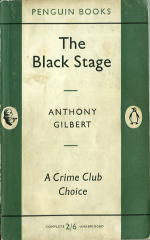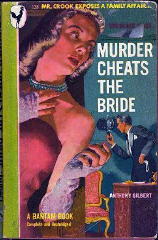Sat 19 Jul 2008
Review: ANTHONY GILBERT – The Black Stage.
Posted by Steve under Authors , Characters , ReviewsNo Comments
ANTHONY GILBERT – The Black Stage.
Penguin, UK, paperback reprint, 1955. Hardcover first edition: Collins Crime Club, 1945. US edition: Smith & Durrell, hc, 1946. Also published as: Murder Cheats the Bride, Bantam #138, pb, 1948.

Between 1936 and 1974 there were, by my count, 50 recorded adventures of a slightly seedy, badly dressed and deliberately vulgar barrister detective named Arthur Crook, of which total this is one. The author, Anthony Gilbert, is described thusly on the back cover of the 1955 British paperback I happen to have:
“Little is known about the author except that his books are among the most popular stories written today…”
Of course we know better now, but it’s remarkable that the secret was kept a secret for so long. Anthony Gilbert was in real life a lady named Lucy Beatrice Malleson (1899-1973), and she has a whole string of other novels to her credit, not all criminous, both under this pen name and two or three others.
The earliest of the Crook stories were never published in the US, but after some point in the early 1940s, all of them seem to have been. Why was he called Crook? What a delightful deceit!
I’ve not read too many of them, and none recently, but I think The Black Stage fits the general overall pattern. Gilbert allows the events leading the inevitable murder to build up gradually, letting the characters (sans Crook) have full rein over their actions and letting the reader in on all of their possible motives, until at last the deed is done. In The Black Stage, that’s on page 74. (The lights had gone out immediately before, and when they are restored someone is standing with a gun in her hand over a body on the floor.) Crook is not met until page 94 (out of 219 in all), having been hired to represent the interests of Anne Vereker, the young woman being held for trial.
Which means, to Crook, finding the true guilty party. Perhaps it’s true in other books in the series, but there’s no courtroom theatrics in this book, only – toward the end – a reconstruction of the crime, designed solely to confuse the real killer into identifying him or herself.

Somewhat earlier, on page 148, Crook confides to his assistant that he knows who the killer is. If this had been an Ellery Queen novel, it would have been a terrific spot to have placed a “Challenge to the Reader.” Which I would have failed, which I almost always do, and in this case, shame on me.
You might be wondering if the 74 pages of preliminary action were at all boring. No, absolutely not. Not at all.
Each of the characters in the drama is wonderfully drawn, and with the widow about to marry a man who is so obviously only looking out for himself (and the woman’s diamonds), and not the others living at Four Acres who would be her heirs or who depend so greatly on Tessa Goodier – stop and take a breath, Steve – it is clear almost from the beginning who the victim will be.
The anticipation only grows and grows, in other words. The ensuing events and the subsequent investigation of the crime is, believe it or not, marginally less interesting – the actions and behavior of the participants less well described. (The author was trying, I believe, to make a relatively simply crime more complex and complicated than it needed to be, but if the middle events were not part of the story, then of course the book would have been, from anyone’s point of view, something less in length than a novel.)
But I love maps in crime novels (and there is one) and re-creations of crimes (of which I have already mentioned there is one also), so all is not lost, and in fact, much is regained.
One is only left to wonder in the end, then, whether the RAF officer Anne Vereker met after the war on the train she’s taking back to her home in the English countryside will manage to find her again. Could it be that now that the war is over, that class status will no longer make a difference to them?
(Not that she may even remember him, but it was he, in the only other part of the story where he comes in again, who recommended Arthur Crook to her cousin to act in her defense. That should count for something, shouldn’t it?)